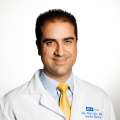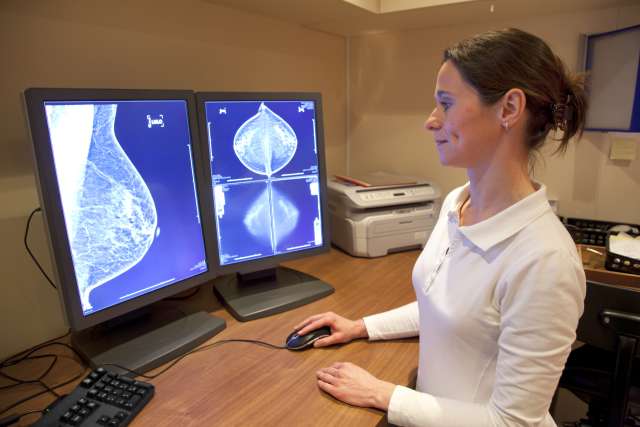As a former health educator who taught the importance of early cancer screenings, Gloria Riley knew better than to put off her colorectal cancer screening.
But hesitancy and the repeated urging by her primary care physician, John Mafi, MD, MPH, were initially not enough to overcome her fear of sedation, the risk of something going wrong, or the discomfort of drinking the prescribed laxative preparation solution.
“It was okay for me to tell everyone else to do it, but when it came to myself, I was totally hesitant,” Riley, 56, says. “I had a big fear and I was just frozen for a long time. I wouldn't do it.”
At 35, her then-doctor recommended early colorectal screening.

“My doctor was saying that as Black people, particularly as a Black woman, those tests were not designed with us in mind and so we likely needed to [be screened] sooner,” Riley recalls. “In fact, he told me that he knew of a young lady who was around my age who had colon cancer and died. But I still didn't do anything.”
Colorectal cancer is the third-leading cause of cancer-related deaths. Compared to white people, Black people have a of colorectal cancer, are more likely to develop it at a younger age and be diagnosed further along in their illness.
This is due to systemic racism in healthcare, social determinants of health including housing, income and access to food, medical co-morbidities, access and utilization of health insurance, and more.
Developing trust
Riley began seeing Dr. Mafi in 2016, when she was 50 years old. In the past, 50 was the recommended age to begin colonoscopy screening. issued in 2020 have updated the age to 45.
Riley shared with Dr. Mafi her fears of experiencing a loss of control from being sedated.

“Gloria was very rationally worried about potential complications of the colonoscopy itself because it is an invasive procedure,” Dr. Mafi says, “Many patients have different reasons for their hesitancy. You have to really try to understand the root cause.”
Dr. Mafi also highlighted the importance of trust-building.
“Developing trust is not easy and takes time,” he says. “It’s not something you can earn through words only, either. Our actions play an important role.”
For four years, Dr. Mafi brought up the importance of colorectal cancer screening with Riley. He made himself available to her and shared statistics and data with her.
“I knew it could happen to me, but fear had a strong hold on me to where I didn’t follow through” Riley says.
Then in 2020, something “just clicked,” she says. Dr. Mafi’s patience and urging helped Riley feel reassured and she trusted his medical advice.
“I got to the point where I was afraid, but I knew I was going to go through with it anyway. I trusted my doctors.”
Gastroenterologist Wendy Ho, MD, prescribed Riley the laxative preparation drink and explained the procedure in detail beforehand, which helped assuage Riley’s fears, she says. On the day of the procedure, Riley asked the nurses to hold her hand.
“The anesthesiologist counted with me and the next thing I remember I was waking up,” she recalls.
In that moment, Riley felt proud of herself. She was eager to let Dr. Mafi know she finally followed through with the procedure and to thank him for encouraging her to have it, providing medical data on the importance and for being so patient with her – answering all of her questions leading up to it.
“I truly cannot thank him enough,” Riley says.
She had put the screening off for nearly 15 years and she was finally on the other side of it.
Next came the bad news: she had a large cancerous polyp that was removed during the screening.
Advice for other patients
When Dr. Mafi received a notification that Riley had undergone the procedure, he knew what a big deal this was for her and sent her a note to ask how she was feeling.
“She wrote back right away and mentioned she was appreciative of my urging because they did end up finding a high-risk adenoma (polyp),” Dr. Mafi says. “I was really happy to learn she had been screened and had the polyp successfully removed. Had she not, the conversation could have instead been about her cancer spreading.”
Riley says if she could go back in time, she would have had the screening, “a lot sooner.”
“I could have full blown cancer right now,” she says. “I think about it all the time. And right after [my procedure] is when Chadwick Boseman died. He was a lot younger than me.”
Six months after the surgery, Riley had another screening. “I wasn’t as afraid as I was the first time,” she says.
There were no signs of cancer. Her next screening will take place in five years.
Riley has advice for other patients: Don't wait for symptoms to develop because it could be too late.
“It doesn't matter if you eat healthy or not. It doesn't matter if no one in your family has ever had it. It doesn't matter what type of lifestyle you’re living. It's still important to get screened because you could be the first in your family.”
Learn more about UCLA Health’s colorectal cancer program and make an appointment.
Related:





